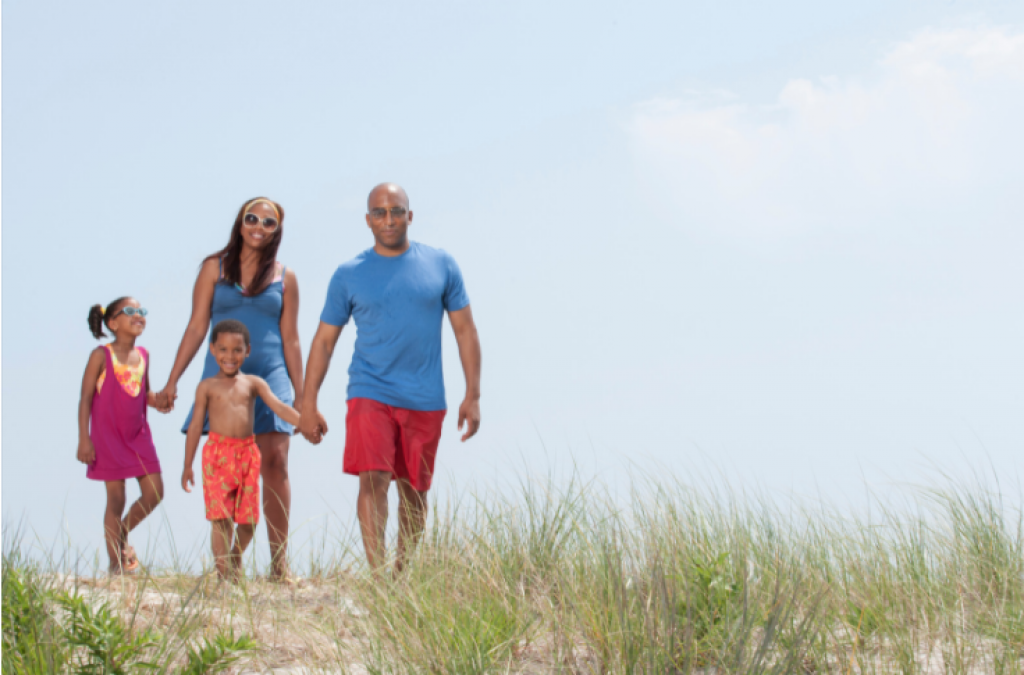Heading to the beach over the summer holidays? Here are our top tips for enjoying the beach safely.
Before you go:
Check the weather
Before you set out, make sure to check the latest weather forecasts so you can be prepared. If it is going to be warm, make sure to take sun cream and to keep it topped up or pack an umbrella to give you a bit of shade during the day. You should also pack bottles of water so that everyone can stay hydrated.
If it is going to be cooler, bring jackets or hoodies for everyone in case it gets cold later in the day and keep topping up the sun cream – just because the sun isn’t shining, doesn’t mean that there aren’t harmful UV rays!
When you check the weather, we also recommend checking the tide times, many weather apps and websites feature this and it’ll help you plan your day.
Choose your beach
If you have kids that want to go for a swim, head tom a lifeguarded beach – many popular beaches have lifeguards during the summer months, but you can find out for certain by searching online via the RNLI here. https://rnli.org/find-my-nearest/lifeguarded-beaches
You can find out which beaches are the safest by looking for those that have been awarded Blue Flag status.
No matter where you end up, make sure to follow any signage that you might see and stay well back from any cliff edges. If there are flags on display, stay within them – this will be a marked area for a reason.
Once you’re there:
Look out for child-safe wristbands
When you arrive, find the TIC or nearest lifeguard and ask if the beach has a local wristband scheme. These schemes help identify missing children, wristbands are handed out to families for free and have a space for you to add your phone number. That way, if your child wonders off or can’t find you, they need only present their band to a lifeguard who can then contact their parents.
If the beach doesn’t have wristbands, you can buy your own online.
Alternatively, on arrival arrange a meeting place with everyone and make sure your child knows your phone number, in case they do get lost.
Watch kids closely
No matter how prepared you are, there will always be something to surprise you, whether that’s unpredictable waves, a sudden gust of wind, a large crowd… It is very easy to get separated, so make sure to have eyes on your children at all times in case they get themselves into trouble, especially if they’re in or near the water.
Don’t ever let them take inflatable toys into the ocean, as these can easily get swept out to sea. If your child is on an inflatable or another floating item like a surfboard, tell them to stay with the board or inflatable and to shout for help. They will be easier to spot and they won’t risk getting tired on the swim back.
Teach the Float to Live method
Float to Live is an easy technique that could help save a life. If you or your children are struggling in the water – try this.
- Fight any instinct to thrash around, this will only make things worse
- Lean back, extend your arms and legs and gently move them to keep afloat
- Float until you have calmed down and rested
- Call for help, or if you are able, swim back to shore.
What to do in an emergency:
It doesn’t matter whether or not you know First Aid, the most important thing to do in an emergency is not to put yourself in danger. If you see someone struggling in the water or in trouble on the shore, call 999 and ask for the coastguard or go straight to the nearest lifeguard. Only attempt to help if it is safe to do so and after you have alerted the coastguard.

